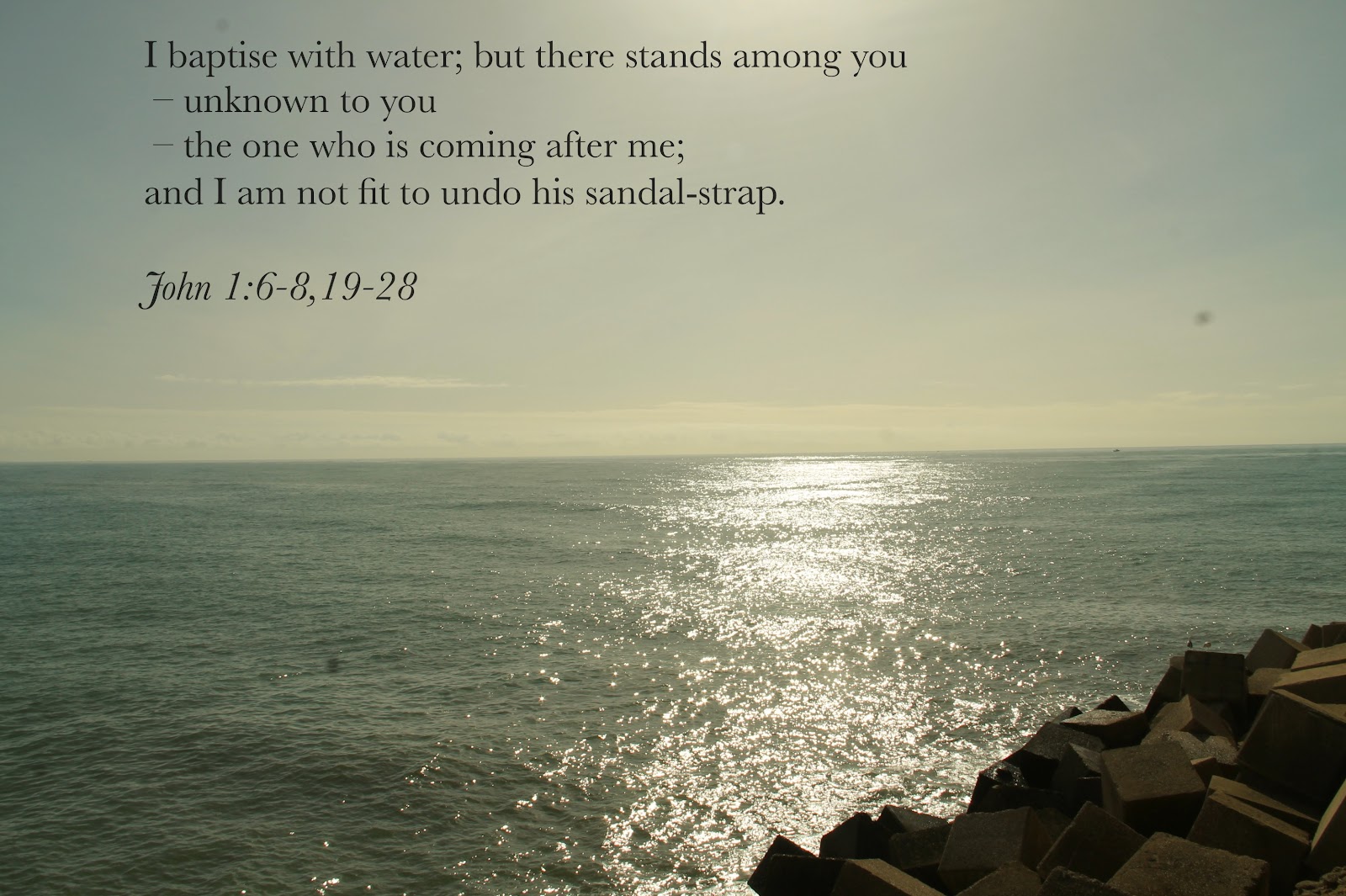| John 1:6-8,19-28 |
|---|
'There stands among you the one coming after me'
During the first part of Advent, we focus on the Second Coming of Jesus Christ. Today's Gospel according to John confirms it. John the Baptist prepared the way for the Lord. In other words, he was the person who preached about the coming of the Son of God.
He knew that he had a great responsibility because he was the witness of God. Although it was sometimes a big burden, he always treated his service very seriously. The truth about the Son of God and John the Baptist is included in the III Sunday of Advent. This day is called "Gaudete" what means, “the Sunday of Rejoicing”.
Why do we use this name? Because Jesus Christ is very close. Saint John said: "I baptize you with water, but there stands among you - unknown to you - the one who is coming after me". The main message is that God is alive and exists.
This truth is very important because many people do not take care of their faith. But Jesus Christ is telling us: I am, I exist, I am the real God.
Today a lot of people die because of their faith. Many Christians suffer, must leave their own houses and towns. People gather at churches, pray on Sundays and during the week. They yearn for God.
One of the burning concern and issue are the difficult situation of people and Christian in Syria and in the whole Middle East, which are the natural place for the believers of Christ. Those people have been there for ever, since the ages. Today because of wars and conflicts, they must leave the place of their fathers and mothers, leaving the emptiness, which would be never fulfil again.
The same may concern Europe, the “Mother” of Christianity, the place which the continent has grown from, again, we become the minority in place, the natural environmental for Christ and his people.
This is our reality.
Paradoxically, the Son of God is often rejected in places that are relatively calm and safe. Why is it like that?
The XXI century has brought people in western countries wealth, money and prosperity, it seems that the western world is a Paradise.
Instead of that, a lot of people here are unhappy, nervous and they cannot find peace and real happiness.
Jesus Christ tells us that we have the free will which is the core of humanity. Freedom comes from God and without God we cannot find real happiness.
God invites us to experience His love, which became a man and has brought us Salvation.
(J 1, 6-8. 19-28)
Pojawił się człowiek posłany przez Boga – Jan mu było na imię. Przyszedł on na świadectwo, aby zaświadczyć o światłości, by wszyscy uwierzyli przez niego. Nie był on światłością, lecz został posłany, aby zaświadczyć o światłości. Takie jest świadectwo Jana. Gdy Żydzi wysłali do niego z Jerozolimy kapłanów i lewitów z zapytaniem: "Kto ty jesteś?", on wyznał, a nie zaprzeczył, oświadczając: "Ja nie jestem Mesjaszem". Zapytali go: "Cóż zatem? Czy jesteś Eliaszem?" Odrzekł: "Nie jestem". "Czy ty jesteś prorokiem?" Odparł: "Nie". Powiedzieli mu więc: "Kim jesteś, abyśmy mogli dać odpowiedź tym, którzy nas wysłali? Co mówisz sam o sobie?" Powiedział: "Jam głos wołającego na pustyni: Prostujcie drogę Pańską, jak rzekł prorok Izajasz". A wysłannicy byli spośród faryzeuszów. i zaczęli go pytać, mówiąc do niego: "Czemu zatem chrzcisz, skoro nie jesteś ani Mesjaszem, ani Eliaszem, ani prorokiem?" Jan im tak odpowiedział: "Ja chrzczę wodą. Pośród was stoi Ten, którego wy nie znacie, który po mnie idzie, a któremu ja nie jestem godzien odwiązać rzemyka u Jego sandała".Działo się to w Betanii, po drugiej stronie Jordanu, gdzie Jan udzielał chrztu.
W pierwszej części Adwentu skupiamy się na Drugim Przyjściu Jezusa Chrystusa. Potwierdza to dzisiejsza Ewangelia według Jana. Jan Chrzciciel przygotował drogę Panu. Innymi słowy, był osobą, która głosiła o przyjściu Syna Bożego.
Wiedział, że spoczywa na nim wielka odpowiedzialność, ponieważ był świadkiem Boga. Choć czasami było to duże obciążenie, zawsze traktował swoją służbę bardzo poważnie. Prawda o Synu Bożym i Janie Chrzcicielu zawarta jest w III Niedzieli Adwentu. Dzień ten nazywany jest „Gaudete”, co oznacza „Niedzielę Radości”.
Dlaczego używamy tej nazwy? Ponieważ Jezus Chrystus jest bardzo blisko. Św. Jan powiedział: „Ja was chrzczę wodą, ale wśród was stoi – nieznany wam – Ten, który po mnie idzie”. Głównym przesłaniem jest to, że Bóg żyje i istnieje.
Ta prawda jest bardzo ważna, ponieważ wiele osób nie dba o swoją wiarę. Jezus Chrystus mówi nam: jestem, istnieję, jestem prawdziwym Bogiem.
Dzisiaj wielu ludzi umiera z powodu swojej wiary. Wielu chrześcijan cierpi, musi opuścić swoje domy i miasta. Ludzie gromadzą się w kościołach, modlą się w niedziele i w tygodniu. Tęsknią za Bogiem.
Jednym z gorących problemów i zagadnień jest trudna sytuacja chrześcijańskiej ludności w Syrii i na całym Bliskim Wschodzie, które są naturalnym miejscem dla wierzących w Chrystusa. Ci ludzie byli tam zawsze, od wieków. W dzisiejszych czasach wojen i konfliktów muszą opuścić miejsce swoich ojców i matek, pozostawiając pustkę, która już nigdy się nie wypełni.
To samo może dotyczyć Europy, „Matki” chrześcijaństwa, miejsca, z którego wyrósł kontynent,dzisiaj stajemy się mniejszością w miejscu, które jest naturalnym środowiskiem dla Chrystusa i Jego ludu.
To jest nasza rzeczywistość.
Paradoksalnie Syn Boży jest często odrzucany tam, gdzie jest w miarę spokojnie i bezpiecznie. Dlaczego tak jest?
XXI wiek przyniósł ludziom w krajach zachodnich bogactwo, pieniądze i dobrobyt, wydaje się, że świat zachodni jest rajem.
Zamiast tego jest tu mnóstwo ludzi nieszczęśliwych, zdenerwowanych, nie mogących znaleźć spokoju i prawdziwego szczęścia.
Jezus Chrystus mówi nam, że mamy wolną wolę, która jest rdzeniem człowieczeństwa. Wolność pochodzi od Boga i bez Boga nie można znaleźć prawdziwego szczęścia.
Bóg zaprasza nas do doświadczenia swojej miłości, która stała się człowiekiem i przyniosła nam Zbawienie.



No comments:
Post a Comment
Note: only a member of this blog may post a comment.